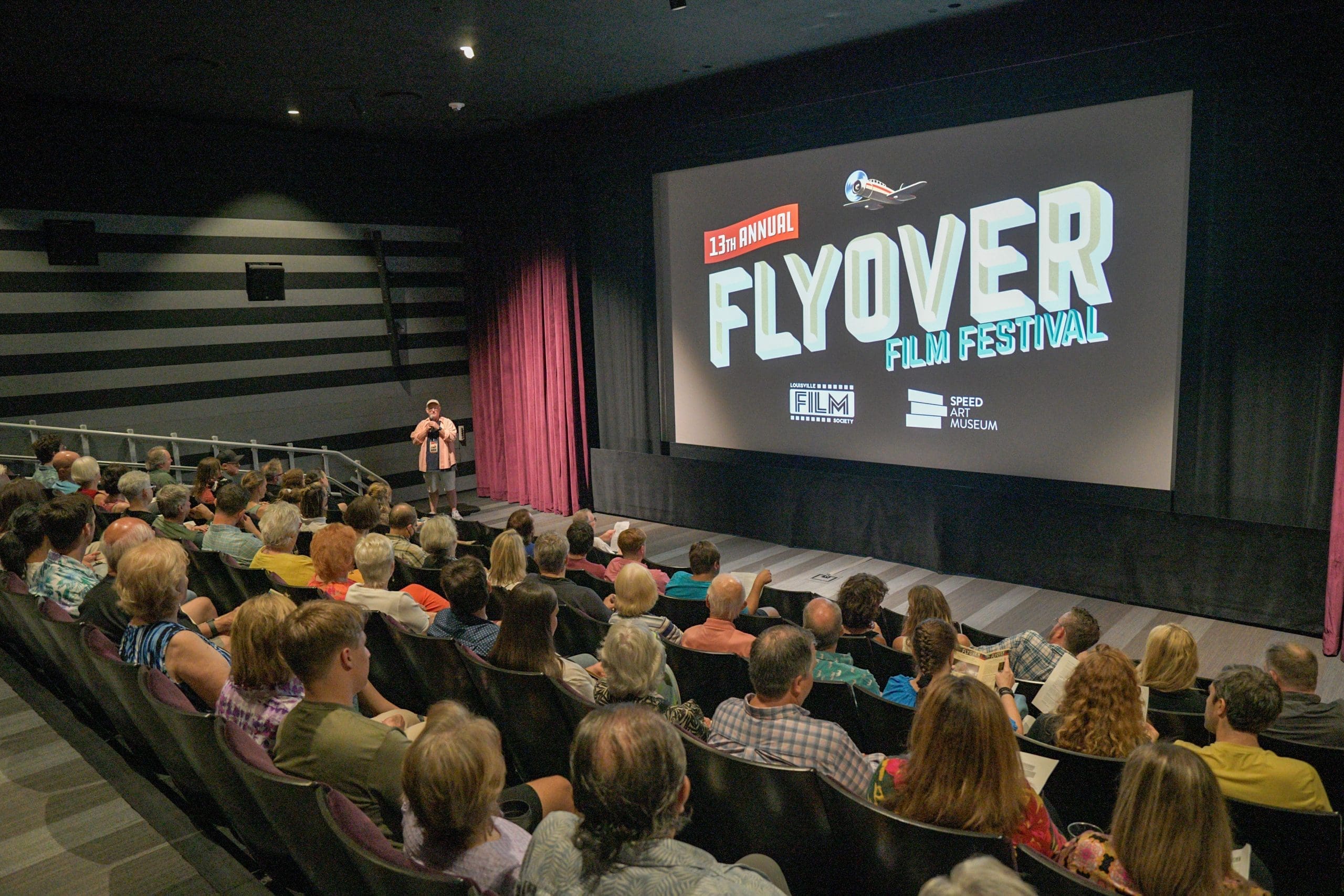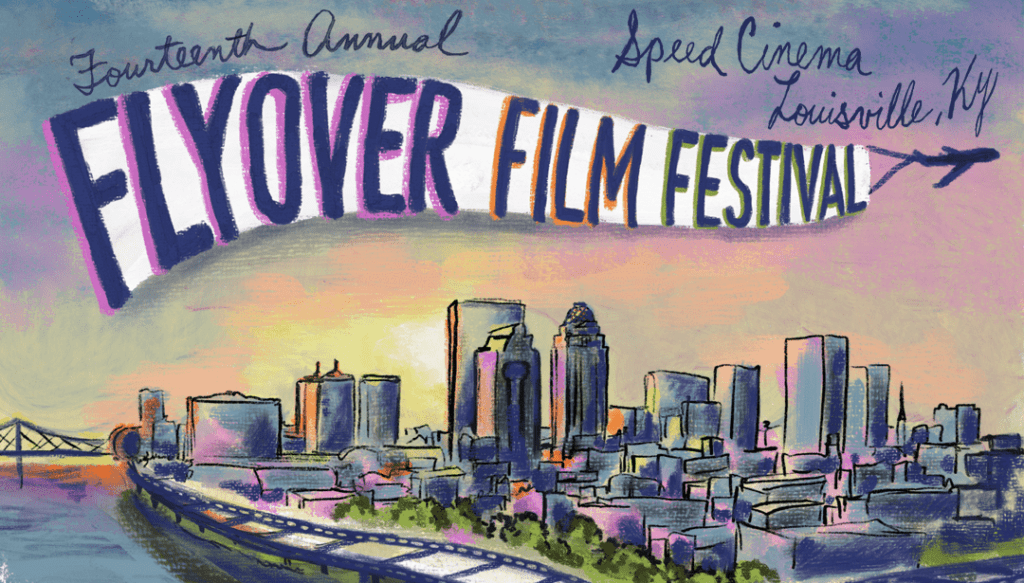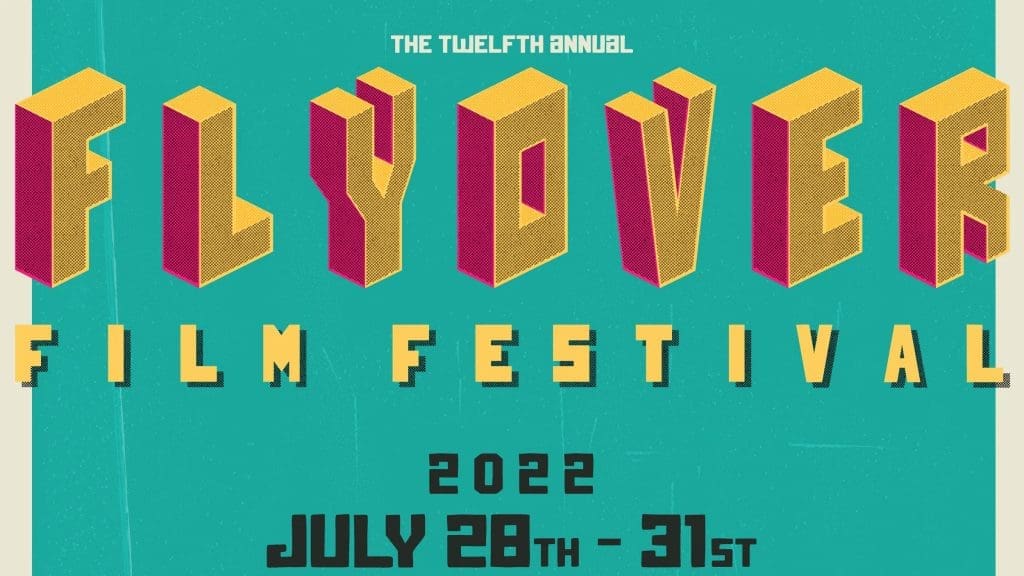The Flyover Film Festival showcased three days of eclectic and electric film. From thought-provoking documentaries to hilarious shorts, it was a weekend full of vibrant storytelling. During an hour-long filmmaker panel on Saturday afternoon, three of the filmmakers engaged in a discussion about the state of indie filmmaking and the process of creating. The conversation, led by Louisville Film Society Board Chair Stu Pollard, featured Margaret Miller, whose comedic short “Poof” follows two women caught in a multi-level marketing scheme; Tom Gustafson, whose film “Glitter & Doom” is a semi-autobiographical romantic musical featuring the songs of the Indigo Girls; and Hannah Bowman, whose documentary “The Playmaker” tells the story of Paul Green, a North Carolina playwright who wrote about race and social justice in the early 1900s.
Here are a few takeaways from the conversation, broken into five categories.
Current challenges in filmmaking
An immediate topic of discussion at the panel was the current writers and actors strikes. The filmmakers at the panel provided insights about some of the points of contention, as well as how it impacts indie artists.
Gustafson has previously worked on blockbusters — such as “The Dark Knight” — as an extra’s casting director. A major point of anger in the SAG-AFTRA strike has revolved around the potential for AI technology to replace background actors.
“They are talking about where they would get their body scanned, and then the studio would own the rights to that scan forever,” Gustafson said. “They could put you into any project. So, basically, there wouldn’t be a need to hire thousands and thousands of extras anymore.”
Reports have already surfaced of studios scanning extras without clear permission.
Residuals, or payments that come from a movie or film airing after its initial window, is another factor in the strikes.
“The 22-episode model, what we’re used to, is kind of gone. We’re down to 8 or 10,” Miller said. “Now, residuals are kind of being less and less and less, so it’s just really hard for people to make a living.”
Not all indie filmmakers are a part of the unions that are striking, but there are ripple effects that have an impact on them, as well as the writers, actors and crew members they work with.
Some small indie projects that weren’t produced by major production companies were initially receiving a green-light from the unions to keep filming, but there has been some recent pressure to halt those hall passes.
“It’s a difficult position for all creatives to be in. Everyone wants to work. But everyone needs to show solidarity with the guilds. And sticking together is the best way make things better in the long run” Pollard said.
Miller, who is not in a union, said that it’s a tricky situation to navigate. She is supportive of the strike, but there’s been interest in attempting to develop “Poof” into a miniseries, and she doesn’t know if it’s right to even take meetings about that.
“We were talking about this the other night: How are you to align yourself with these unions and make sure you’re not crossing lines and make sure you’re supporting them, while also trying to establish your career,” Miller said. “It’s unfair for everyone. It’s not just me who has a short film out. It’s unfair across the board: everyone has a pitch, everyone is losing work.”
What the film editing process looks like
Bowman had hundreds of hours of footage and assets that didn’t make it into “The Playmaker.”
During the panel, she said: “I was really lucky, because probably the hardest part of my film was taking all of this and cutting it to just one hour.”
Bowman said she likes editing, and works based on “instinct” and trusting herself.
“Usually, if you’re watching through something and it it makes you stop and you forget that you’re breathing for a little bit — I have a few sections in my film where Paul Green just talks for a minute and a half, and those are the sections that made me want to make the movie in the first place, so I think you just know,” Bowman said. “That’s the art part of it. A lot of filmmaking is science and structure, story structure, things like that, and business. And, a lot of it, especially in the editing room, is just making art.”
Miller, whose short “Poof” has a runtime of ten minutes, said: “I’m a pretty fierce editor, I’m not very scared of editing.”
Then she dove a little deeper into her process, and how her writing and editing timelines generally unfold.
“I feel like you write the script three times,” Miller said. “You write it [the first time], you write it on set and then you write it in the editing room. And the editing room, I feel like, for me, is the bulk of the writing. That’s what I was the most nervous about, because that’s when it becomes yours.”
Backstories from the films
Gustafson’s partner of 25 years, Cory Krueckeberg, wrote “Glitter & Doom,” a script that is loosely biographical on their love story, as a surprise anniversary gift.
The film also uses music written by the renowned folk-rock duo Indigo Girls, who also have roles in the movie.
The film is a musical, but initially there were only placeholders for the music as the plot was ironed out.
“The first group that came to mind is Indigo Girls, because they were so important to our own soundtrack of us meeting and my college days and we’ve seen them a thousand times,” Gustafson said. “And we reached out and immediately they gave us permission, and they said, ‘You can have our entire catalog.’ Like, just go crazy.”
“The Playmaker” also has a prominent music component, featuring a score from the bluegrass band Kentucky Shine.
“Music is a really important part of my film,” Bowman said. “It’s as much about Paul Green as it is about the South. So, I wanted to have a Southern Gothic score, sort of underscoring everything in it.”
“Poof” is a razor-sharp comedy about multi-level marketing (MLM). Miller said people that she was around growing up, including those in her family, sold Mary Kay, which was the seed of the idea.
“The problem is, is that it’s a pyramid scheme,” Miller said. “And you will lose money. Everyone except the people at the very top lose a lot of money. I got obsessed with cult culture and MLM has a lot of cult culture, as in toxic positivity, and the American dream of, ‘You can do anything you want, you’re the only one in your way.’ They have a very specific way to keep people under their grasp. Because the American Dream is neither good nor bad. You can do anything you want, but you have to comment on the forces that are against you, you have to recognize them. MLM is a huge force against these women.”
Workshopping a new film to an early audience
Bowman’s first test screening was giving her mom a sneak peek.
“My mom loves me and supports me, and she said, ‘That ain’t it,’” Bowman said. “It was bad, and I thought it was pretty good. And so I had to take some time, maybe a month off, because if your mom is telling you it’s bad, it’s bad. I went back and completely restructured the story.”
Gustafson does several rounds of test screenings, and during each, the audience is asked a very specific set of questions based on the feedback needed. For example, early on in the process, the questions might ask people when they were bored and when they weren’t. Later on, there might be complex questions about a specific character’s personality or journey.
“It’s really important to us to do these screenings, and we bring in a lot of people that we trust, but we also bring in some random people, even outside of the film world,” Gustafson said.
Miller said that it’s important to stay focused during the feedback period.
“You get to a moment where you’re like, ‘I got it. I got it. You’re welcome.’ And everyone is like, ‘mmmmmm,’” Miller said. “And that’s like a very, very hard moment because you don’t have the energy. You have to kind of pick yourself up, be like, ‘Ok, we’re going back in.’ And that’s when the science of it really starts. That’s when everyone just kept telling me, around me, ‘Just don’t get tired.’”
Advice for new filmmakers
The panel’s final segment centered around advice that the filmmakers would give to other aspiring creatives, based on their experiences.
Bowman said not to try to create a movie by yourself.
“Find a team of people to help you,” Bowman said. “Probably the thing that was the most difficult for me is feeling like I didn’t have anybody to help me. And I probably should have reached out more, but I felt like I was in it by myself. I shot it, I edited it, I wrote it, I did the visual effects. I did all of it and it was exhausting and it took forever. It took a toll on my mental health.”
Gustafson spoke about finding ways to stretch your budget.
“Really looking outside of the box,” Gustafson said. “When you put a feature together, you want your keys and everybody to be extremely passionate about it, but then also figuring out how to make your money go further, which is what we did when we brought it to Mexico, and there are many opportunities now to shoot in other states, that have great tax incentives. But, really do your homework.”
Miller said that a lot can be learned by watching and absorbing the type of film that you want to make. She said a lot of prominent shorts can be watched for free online.
“Just watch a bunch of them,” Miller said. “Watch a ton of film. And it will just kind of get into your subconscious.”



